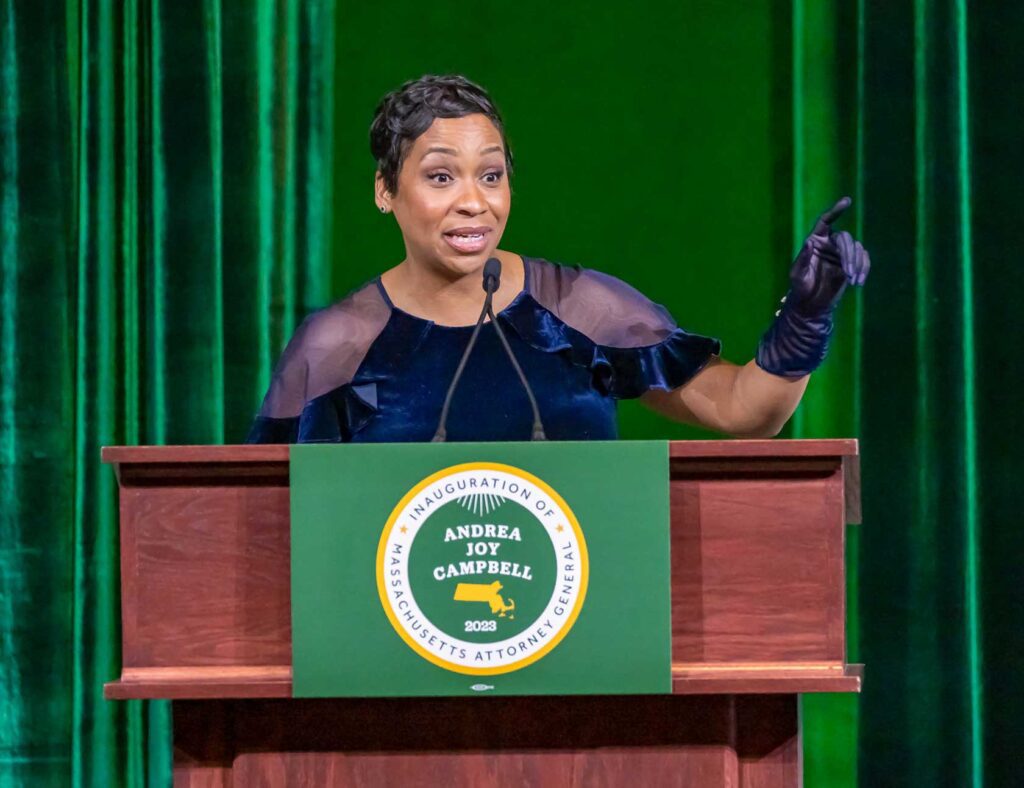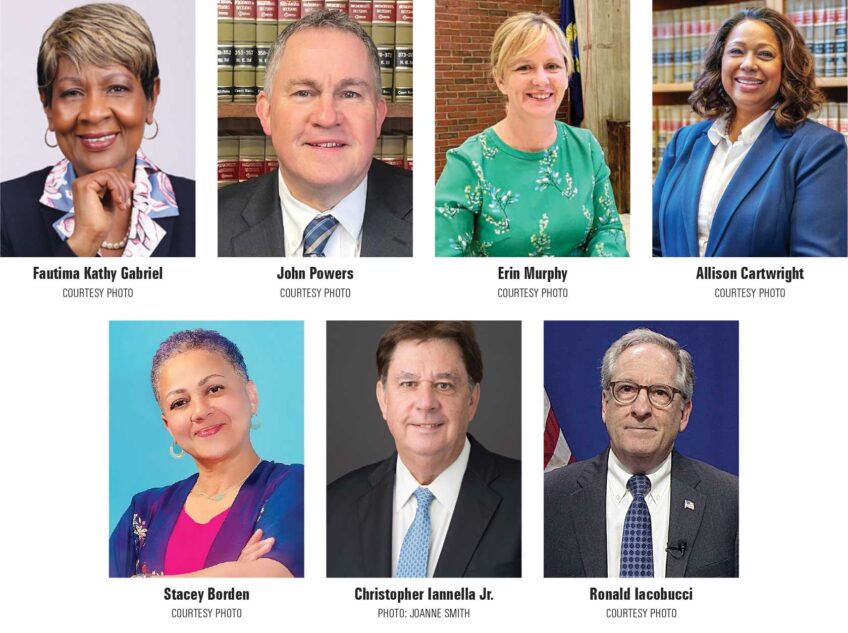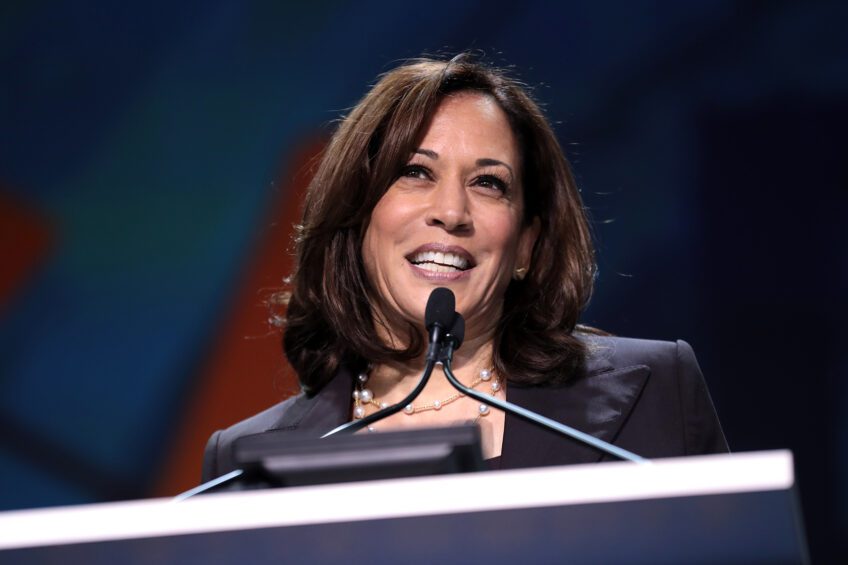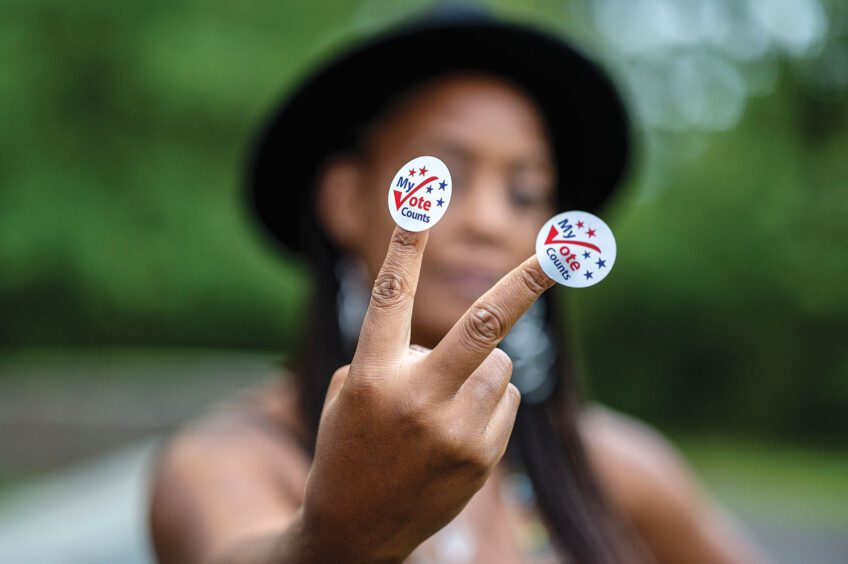
At the dawn of 2023, Massachusetts politicians were celebrating the historic electoral victories of Maura Healey, the state’s first woman governor, and Andrea Campbell, the first Black woman elected statewide in Massachusetts history.
Along with state auditor Diana DiZoglio, these history-makers benefitted from a progressive push at the polls during an electoral season that saw voters overwhelmingly pass the Fair Share Amendment, the first progressive reform to the state’s tax code since the income tax was instituted in 1916.
Healey came out of the gate touting a progressive agenda during a January speech before the Legislature. Among her initiatives: an equity audit of her administration, aimed at ensuring that those long shut out of opportunities in state government are given access; free community college for students 25 and older; and investments aimed at restoring quality service to the MBTA, bolstering early education and increasing production of affordable housing.
Over her first year, the governor’s agenda encountered some strong headwinds, including the persistence of slow zones on MBTA subway lines and snail-like service on the newly-constructed Green Line extension through Somerville and Medford due to improperly installed tracks.
In other areas, the governor’s own pledge to cut taxes may threaten her agenda. The Legislature approved a raft of tax cuts that ranged from an increase in the child tax credit on the progressive side to cuts to short-term capital gains taxes, the estate tax and business taxes on the regressive side. The package, which the Healey administration expected would take a $742 bite out of the state budget, came as the state’s revenue has been trending downward — with collections more than $600 million below projections by December.
That shortfall coupled with Healey’s tax cuts could nearly zero out the Fair Share Amendment’s projected $1.5 billion in revenue from the surtax it levied on annual income over $1 million — undercutting a major win for progressives in 2022 who crafted the ballot question to channel funds to education and transportation.
At her historic swearing-in, Campbell outlined plans to fight wage theft and defend worker rights, prosecute public corruption, fight elder abuse and defend women’s reproductive health, among other priorities.
Campbell also has prioritized police corruption and overreach, initiating an investigation into the Boston Police Department’s controversial gang unit, which has long been accused of targeting Black and Latino youths and erroneously labeling teens as gang members.
City Council
At the local level, the aftermath of the Boston City Council’s contentious redistricting fight in 2022 spilled over into 2023 when a group of four conservative-leaning city councilors joined and funded a lawsuit against their council colleagues, claiming that the body erred in discussing race in its deliberations on district lines.
The lawsuit, which councilors Michael Flaherty and Frank Baker funded in part with donations from their campaign accounts, forced the council to re-draw their map in May. The bitter debate over the redistricting process was one of many racially-charged conflicts that roiled the council this year, leading many in the news media to push a narrative of unprecedented dysfunction on the 13-member body. For some in the Black community, the conflicts, which most often pitted the body’s four Irish American members against the Black, Latino and progressive-leaning white members, harked back to the era 20 years ago when the then-majority-white council was often at odds with the four Black, Latino and Asian American members who formed “Team Unity.”

City Councilor Ruthzee Louijeune (left) and Erin Murphy during the redistricting debate. The bitter debate over the redistricting process was one of many racially charged conflicts that roiled the council this year. PHOTO: CITY OF BOSTON
The year produced more than its share of votes that split along racial lines, including a contentious October vote on funding for the Boston Regional Intelligence Center, which houses the Police Department’s controversial gang database.
Black and Latino councilors argued funding for the intelligence center would increase surveillance on Black communities and has in the past opened the door for police to share information on undocumented immigrants with federal authorities.
Mayor Michelle Wu, who on the campaign trail in 2021 said she supported shuttering the gang database, asserted that the Police Department has improved during the first year-and-a-half of her administration and is now better able to rein in abuse.
The racial and ideological divide on the council also surfaced when Councilor Erin Murphy mistakenly argued that there had been 740 cases of sexual assault in Boston’s Public Schools in the previous year and called for metal detectors and uniformed police officers in schools. A letter she and councilors Flaherty, Baker and Ed Flynn signed in January gained no support from the other nine councilors and prompted no action.
Despite the divisions, the council produced significant legislation during 2023, including home rule petitions advancing rent control, an elected school committee and a real estate transfer tax.

District 5 Councilor Ricardo Arroyo COURTESY PHOTO, District 6 Councilor Kendra Lara BANNER FILE PHOTO
The divisions on the council played prominently in the September preliminary election, a typically low-turnout contest that saw two of the body’s most progressive members — Ricardo Arroyo and Kendra Lara — lose their seats to challengers. Both incumbents were targeted by an upstart independent expenditure political action committee funded mainly by Trump-supporter and New Balance President Jim Davis. The PAC spent upwards $300,000 in advertising and push polls targeting the two.
Lara and Arroyo also had garnered negative news coverage — Arroyo for representing his brother in a lawsuit against the city, for which he paid a fine, and Lara for an auto wreck in which she was driving with a suspended license. Both faced candidates backed by Wu and their conservative-leaning council colleagues.
Wu came out the winner in the election, having backed four winning candidates: her former director of neighborhood services Enrique Pepén in Hyde Park-based District 5, attorney Ben Weber in the Jamaica Plain/West Roxbury District 6, her former campaign aide Sharon Durkan in the Back Bay-based District 8 and her former director of civic organizing Henry Santana in the at-large race.
Mayor Wu
Wu’s apparent consolidation of power on the council came during a year where she has taken increasingly bold moves, some at odds with the unabashedly progressive stance she took in her 2021 campaign for mayor.

Mayor Michelle Wu, BPD Commissioner Michael Cox, and BPPA President Larry Calderone discuss details of the tentative agreement with the Boston Police Patrolmen’s Association. PHOTO: MIKE MEJIA, MAYOR’S OFFICE
In January, she announced her administration would move forward with separating the planning functions of the Boston Planning and Development Agency from its role in managing the development process, following through on a key campaign promise.
Wu also announced a design study for the construction of new school buildings, noting the years-long process for constructing a new Josiah Quincy Upper School building. In December, her administration announced it would construct a new building in the Dorchester/Mattapan area to replace the Shaw and Grew elementary schools, which according to city plans will merge into one community.
In a June announcement that came as a surprise to many, she announced plans to relocate the John D. O’Bryant School of Mathematics and Science, one of the city’s three exam schools, to the former West Roxbury Educational Complex, drawing angry responses from students, parents and teachers at the school.

Mayor Michelle Wu hosts a press conference to publicly acknowledge the harms caused by the City of Boston to the Black community
and formally issue an apology to Alan Swanson and Willie Bennett for their wrongful arrests following the death of Carol Stuart. PHOTO: JOHN WILCOX, MAYOR’S OFFICE
Wu also took an increasingly aggressive stand against the homeless encampments in the Mass and Cass area, ordering police to sweep tents from the area — a move that had support from business owners and abutters in the area and drew fire from civil liberties activists.
She scored a victory in December, negotiating a police contract with significant reforms and a significant pay raise for members of the Boston Police Patrolmen’s Association.
But her administration drew intense backlash from right-wing forces this month after an aide invited — and then uninvited — white city council members to the annual Electeds of Color holiday party.
Wu also received praise last week when she issued a formal apology for the city’s actions 34 years ago during the infamous Charles Stuart case. Stuart tried to hide his role in the gruesome murder of his pregnant wife by lying and accusing a Black man. Last week, Wu apologized to Willie Bennett and Alan Swanson, both of whom were wrongfully linked to the case.
The political year ended on a hopeful and restorative note.








